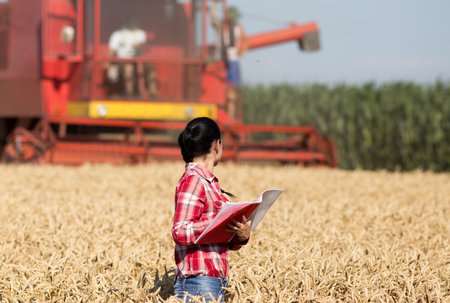The AWC took place last week and Iris Meck feels proud
By Jennifer Jackson
Last week, Western Canada celebrated women’s role in agriculture at the Advancing Women in Agriculture Conference (AWC), March 6 and 7. The conference timely took place before International Women’s Day on March 8.
The first Advancing Women Conference was created by Iris Meck of Iris Meck Communications in 2014. Meck realized there was a lack of opportunities for female leaders in agriculture and food to network and share learning experiences. She also wanted a program to promote and encourage the next generation of leaders in the agricultural industry.
To date, Meck and her team have held six conferences across Canada for some 3,500 women in agriculture, representing over 400 organizations.
Farms.com recently had the opportunity to ask Meck to reflect on the conference.

Farms.com (Farms): How did the conference go last week?
Iris Meck (IM): In Calgary on March 6 and 7, we had over 460 delegates representing more than 205 local, national and global businesses. Delegates attended from six Canadian provinces, five U.S. States, and many sectors within agriculture. More than half the room was people who were new to the conference.
The most amazing thing is to see the community and the connections that are fostered at this conference. We’ve had women here as young as 20 and others who are celebrating many decades in our industry. I love seeing the way the connections women make go far beyond these walls. I see how friendships made here have grown into other groups for women in agriculture across the country.
There is definitely a ripple effect when we all gather together in one room and share our passions for the benefit of everyone in agriculture.
Farms: What were some of the recurring messages at the conference?
IM: At our conferences, we always discuss several topics around leadership skills development, finances, health, life balance, communications and mentoring, but there are also often ‘hot’ topics that come out of every conference.
At the Calgary event this year, there were many discussions around the ways that we, as women, can help share the story of agriculture with consumers and build public trust. Another strong theme was the idea of community building and how women can support and help each other in positions on the farm, in agribusiness or in our family lives. And, finally, one thing we heard over and over was an especially good message for those just starting out in agriculture: that a career or life in agriculture is rewarding and full of opportunities for learning, advancement and travel.
It’s really inspiring to hear how many of the women at the conference feel that we are in an industry where positive changes are occurring and where women have many opportunities in front of them.
Farms: Why should women in agriculture attend the conference?
IM: The Advancing Women Conferences are a place not only to celebrate the women in agriculture who make this industry a vibrant and inspiring place to be, but also an opportunity for women in our industry to network and learn from each other, which builds confidence for each woman who attends.
Our industry can sometimes be isolating due to the great distances inherent in agriculture. Often, our network is made up of people we have connected with by email or phone, but that we have never met. AWC gives women a tremendous opportunity to meet other women face-to-face and strengthen these important networks, while at the same time learning valuable skills they can take back to their work, their families and their community.
Farms: What does International Women’s Day mean to you – especially in the agriculture industry?
IM: Women around the world, both in developed and developing countries, contribute significantly to the production of crops and food. Often, though, women’s contribution goes unrecognised or is minimized – especially in developing nations. Women in developing countries often face barriers like receiving low pay for their labour, difficulties securing financing, or a lack of access to the training or tools they need.
In developed countries, we are fortunate to have an environment that is more open to women as equal partners in agricultural production and food security. Few policies deter or deny women’s involvement in Canada’s agricultural production and trade.
International Women’s Day gives Canadians a chance to celebrate our great women leaders in agriculture. (The day) also gives us the opportunity to shine a light on the significant challenges faced by other women in agriculture in developing nations. We’ve come a long way, but we also have a long way to go.
Farms: What tips/advice/lessons do you have for women/young women in agriculture?
IM: I truly believe there are great opportunities today for women in agriculture and business. I would encourage women who are starting out in agriculture to be eager to learn about their industry. You don’t have to have decades of experience to get involved in leadership positions at work or on the farm, or to join groups that craft agricultural policy. Our industry needs the passion and skills that women bring to the table.
Above all, believe in yourself and don’t be afraid to fail. I learned the most when taking risks, even though doing so was often difficult. When you strongly believe in your goals, and maintain a positive attitude, good things can happen. It’s also important to surround yourself with positive people.
And, finally, take advantage of any of these networks that are springing up for women in agriculture around the country. As one of our past Advancing Women Conference speakers, Chantelle Donahue, put it so beautifully at our Calgary conference last year: “If you want to go fast, go alone. If you want to go far, go together.”